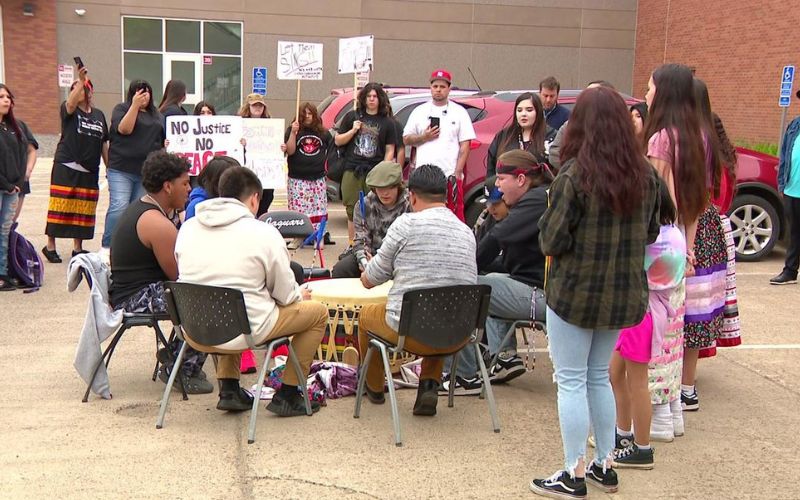
- Details
- By Jenna Kunze
More than 40 high school students walked out of class in central Minnesota last Wednesday in response to their school board denying a tribal drum group the right to perform at their upcoming graduation ceremony.
In response to a Hinckley-Finlayson High School student drum group’s request for the second year in a row to perform a traditional Honor Song at their May 24 graduation, the school board voted on Monday, May 13, “to limit presentation and performances by extracurricular student groups,” according to a statement provided to Native News Online by District Superintendent Brian Masterson.
“The School District’s attorney has advised me that allowing extracurricular groups to put on spiritual or religious performances during graduation creates legal risk if members of the community feel the District is endorsing a religious group as part of the graduation ceremony,” Masterson said at the school board meeting. “The District needs to avoid the perception that it is endorsing any religion as part of graduation, as courts have found that violates the Establishment Clause.”
Now, Native students—who make up about a quarter of the student body—and local tribal leaders, are pushing back against the board’s assertion that their culture is a religion.
“The tradition of playing tribal drums at graduation pays tribute to students and provides them with a sense of accomplishment and honor within their home community,” Melanie Benjamin, executive director of the nearby Mille Lacs Band, said in a recorded response to the board’s decision. “We thought we had reached the point where we didn’t have to fight these battles. I guess we were wrong.”
She added that 21 Native students will be graduating at The Hinckley-Finlayson High School’s May 25 ceremony, and that drum circles are a traditional way of celebrating such an accomplishment in Native communities, for both Native students and non-Native students alike. She added that the University of Minnesota, Morris, recently had a graduation ceremony where the university allowed a drum group performance.
Benjamin said that Native American community members are not taking the school board’s decision lightly, and that she’s reached out to the school board, the state’s Attorney General’s office, to the Governor’s Office, and to Minnesota Senator Tina Smith’s office for help educating the school board on it’s “shameful” decision.
More Stories Like This
Bard College Center for Indigenous Studies (CfIS) Hosts Annual Symposium With Keynote Speaker Miranda Belarde-Lewis on March 9–10American Indian College Fund Announces Spring 2026 Faculty Fellow Cohort
Navajo Nation Signs $19 Million Diné Higher Education Grant Fund Act into Law
Dr. Shelly C. Lowe to Be Inaugurated as IAIA President March 26–27
Tlingit Language Courses Expand for Students to Learn With Families At-Home
Help us defend tribal sovereignty.
At Native News Online, our mission is rooted in telling the stories that strengthen sovereignty and uplift Indigenous voices — not just at year’s end, but every single day.
Because of your generosity last year, we were able to keep our reporters on the ground in tribal communities, at national gatherings and in the halls of Congress — covering the issues that matter most to Indian Country: sovereignty, culture, education, health and economic opportunity.
That support sustained us through a tough year in 2025. Now, as we look to the year ahead, we need your help right now to ensure warrior journalism remains strong — reporting that defends tribal sovereignty, amplifies Native truth, and holds power accountable.
 The stakes couldn't be higher. Your support keeps Native voices heard, Native stories told and Native sovereignty defended.
The stakes couldn't be higher. Your support keeps Native voices heard, Native stories told and Native sovereignty defended.
Stand with Warrior Journalism today.
Levi Rickert (Potawatomi), Editor & Publisher


